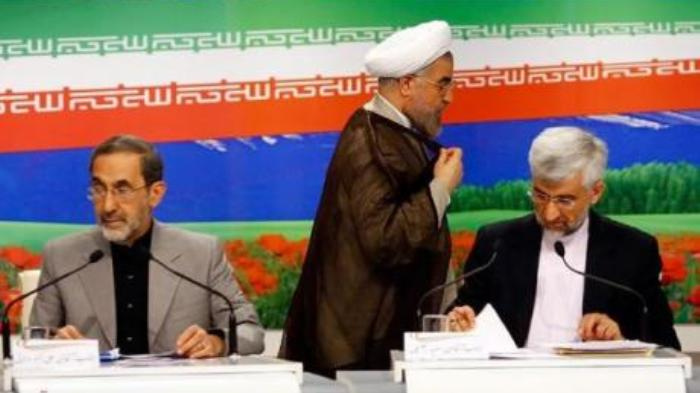Finally, a Chance to Retort

By: Ali Attaran
“The nuclear dossier was handed to the 11th Administration [of Rouhani] at a point when the Islamic Republic had reached a momentous point in its nuclear progress; but with recognizing the JCPOA, we have relinquished nearly one-hundred items of our inalienable rights. Unfortunately, we have acknowledged Iran as an exceptional case; that is, we assented to having fewer rights and more commitments compared with other nuclear countries. Worse, we even retreated from our rights explicitly stated in the Geneva Deal.”
Saeed Jalili’s remarks, published in his unofficial Instagram account on Monday, have infuriated the Reformist and pro-Rouhani media and provoked a wave of harsh criticism. The comments were made during a hearing session in the Majles, the Iranian parliament. Jalili also claimed that national security-related red lines have also been violated since the nuclear team has allowed for “unconventional inspections” by the IAEA. The former chief nuclear negotiator also expressed skepticism about the JPCOA joint commission to be formed by Iran and its negotiating partners, arguing that it would easily pave the way for the snapback of sanctions.
The full text of Saeed Jalili’s remarks have yet to be released. Hossein Naghavi, speaker of the parliamentary Special Committee assigned with analyzing the JCPOA, gave a brief report of Jalili’s remarks in an interview with Fars News Agency. According to Naghavi, Jalili argued that exploitation of nuclear energy via an independent, indigenous industry is the Islamic Republic’s ultimate decision, regardless of the administration in power. “Any [foreign] leverage that holds us back from our nuclear rights will hinder our progress in all industrial and scientific fields” the former nuclear negotiator and head of the National Security Council had said, according to Naghavi.
Pro-deal media, from the Reformist and moderate camps, were quick to retort. The Reformist Ghanoun reminded of a sarcastic quote by former US nuclear negotiator Robert Einhorn regarding Jalili’s negotiating approach: “we learned a lot about Iran’s history during talks with Saeed Jalili”. The newspaper criticized Jalili for attempting to undermine achievements of the nuclear talks and for casting doubt over the performance of Rouhani, Zarif and the nuclear negotiating team “whose diplomatic skills have been admitted by all the political and diplomatic observers.” The newspaper reminded that Jalili was the presidential nominee of the hardliner Perseverance Front, and accused him of taking this opportunity to cover up his electoral defeat against moderate Rouhani in the 2013 presidential election.
“Committee of Experts or a Place to Impair?” Arman, the vocal pro-Rafsanjani newspaper, also slammed Jalili’s remarks. “Diplomats not bowing to the highest-ranking officials of six world powers, their jubilant, proud faces in the toughest moments of negotiations a symbol of Iran’s power in the eyes of the world, their warning not to threaten Iranians a powerful reminder for the world’s powerful, now do not know how to deal with harsh domestic criticism,” said Reza Raeisi, the author of the piece, in his lurid introduction. “There is no need to speak about the result of nuclear talks during the six years the previous team was at the helm, and about the fundamental shifts the present administration has brought about. Any impartial observer would know the differences. But the point is, even if the negotiating team and their enormous, evident achievements are deprived even from minor appreciation, [one expects] at least that the [parliamentary] tribune supposed to be utilized for expert, scientific and academic criticism not turn into a platform for disproportionate dismantling and political retaliation; and the JCPOA, strongly connected to national interests, should not be sacrificed within the bipolar partisan atmosphere.”
Officials also reacted to Jalili’s remarks. Former FM Ali-Akbar Velayati, who had strongly criticized Jalili during presidential debates in June 2013, reacted to his remarks, albeit milder than two years ago. “That is what he has concluded through his own examination,” of the JCPOA he said, expressing hope that the parliament’s conclusion would eventually serve the interests of the Islamic Republic of Iran.
A key member of the negotiating team, Hamid Baeidinejad, also responded to Jalili’s remarks from a technical perspective. Addressing Jalili’s claim about ‘one-hundred rights taken away from Iran’, Baeidinejad argued that inalienable entitlements cannot be revoked by any legal document. The head of Iran’s team of experts during the negotiations also stated that the Joint Comprehensive Plan of Action (JCPOA) is inherently a political document, not a legal one, and even if ratified by the Iranian Parliament, its nature will not change for the negotiating partners.
Jalili’s Monday remarks provided an opportunity for pro-Deal media to castigate him following several years of serious restriction set by the former head of the National Security Council and chief nuclear negotiator over coverage of talks with the P5+1. However, with Supreme Leader Ayatollah Khamenei’s recent support for Majles’ strong role in examining the JCPOA, stronger criticisms will be on the way.

